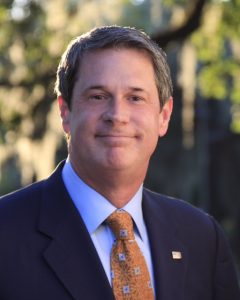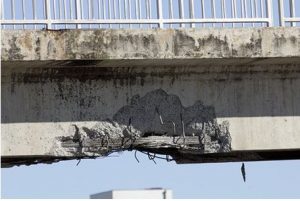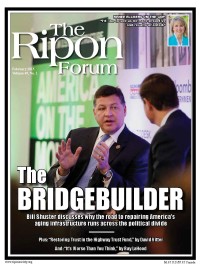 We can all relate to sitting in traffic. The frustration, the gridlock – it all seems reminiscent of Washington politics. In this new Congress, however, there is hope for movement and progress when it comes to updating our nation’s roads and highways.
We can all relate to sitting in traffic. The frustration, the gridlock – it all seems reminiscent of Washington politics. In this new Congress, however, there is hope for movement and progress when it comes to updating our nation’s roads and highways.
The transportation infrastructure in our country is in desperate need of attention. While Congress has been able to come up with short-term fixes in recent years, we need to pass long-term reauthorization legislation that invests in rural areas, expands flexibility for state and local governments, and improves safety. We need a bill with investments to create new jobs, provide a boost to the economy, and keep us competitive in the global marketplace.
And perhaps most pertinent to our daily routine, we need to prioritize traffic relief.
As the former top Republican on the Environment and Public Works (EPW) Committee and current Chairman of the Subcommittee on Transportation and Infrastructure, I am aware of the major challenges ahead. But I’m very upbeat about the outlook.
We have overwhelming bipartisan support to move forward with investing in our nation’s transportation infrastructure and making critical reforms. But, at the same time, one of my top priorities is to ensure that we are responsible with taxpayer dollars and push for greater efficiencies in our infrastructure policy.
Our surface transportation infrastructure consists of several categories or types of roads that come together to create a network. In order to have a healthy and efficient network that can move people and goods, all the pieces of that network need to be cohesive and strong.
This means investing in the critical rural roads and bridges that we rely on to safely get our kids to school and move this country’s vast resources including our agricultural and energy resources to market. This means investing in the Interstate system to relieve congestion, expand the lanes of commerce, and improve our connectivity. And it means investing in the vital corridors that link the two.
For example, in Louisiana, I’ve made I-49 South and LA 1 two of the top priorities. These two highways are the lifeline for major development projects in Louisiana. Plus, they’re key to getting Louisiana’s resources delivered to the rest of the country.
Having a comprehensive network is a fundamental component of our nation’s economy and our quality of life. First-class transportation infrastructure in all regions of the country is essential to connect people and communities, and is a critical building block in developing, sustaining, and growing an economy.
However, we can’t work toward that cohesive network if we don’t have a reliable Highway Trust Fund and prioritize proper investment in streamlined, flexible programs. We must restore trust in the trust fund.
That’s why my first goal this year is to reauthorize MAP-21 (“Moving Ahead for Progress in the 21st Century”), a long-term reauthorization highway bill that prioritizes projects that improve traffic flow and relieve our clogged roadways. A smart way to do this will be allowing projects to be bundled together in order to streamline the approval process, consolidate unnecessary paper work, and maximize efficiency to complete projects under cost and ahead of schedule.
My first goal this year is to reauthorize MAP-21, a long-term reauthorization highway bill that prioritizes projects that improve traffic flow and relieve our clogged roadways.
Last year, I was able to successfully pass a MAP-21 reauthorization out of committee with the help of my colleagues on both sides of the aisle. Already this year EPW Chairman Jim Inhofe (R-OK) has held the first full committee hearing on MAP-21. This is a good sign to get the momentum going in the coming months.
Another major, necessary reform is improving oversight and transparency of how we invest in our roads, highways, and bridges. A prime example is the Highway Trust Fund, which is – again – accelerating towards bankruptcy, and without Congressional action, the Department of Transportation will have trouble meeting obligations sometime this summer and payments to states and local governments will slow down.

It was originally designed to create a sustainable fund paid for by users to benefit those users. However, since 1993, the trust fund has relied on a set of static funding mechanisms to maintain and grow this nation’s infrastructure. As a result, every year its purchasing power is eroded by rising gas prices, increased fuel efficiencies, inflation, and the rising cost materials.
While short-term fixes have allowed the trust fund to continue operating, taxpayers continue to drive on deteriorating roads and bridges wondering where their taxpayer dollars have gone or if future investment may or may not be utilized on a project by project level.
If we are going to be successful at putting such a structure back on a sustainable course and deliver on the economic promise of sound infrastructure investment, we must restore trust back in the Highway Trust Fund.
That starts with showing where the funding is going and making sure the money is being spent wisely. This also means working to make sure that state and local leaders are determining where our dollars are being spent, not federal bureaucrats.
While short-term fixes have allowed the trust fund to continue operating, taxpayers continue to drive on deteriorating roads and bridges wondering where their taxpayer dollars have gone.
This year on the EPW Committee, we will move into more comprehensive discussions of our transportation infrastructure needs and look for more reform solutions. We can’t create jobs, start economic growth, and begin to meet our infrastructure obligations if Congress, States, and local communities aren’t approving and building projects.
Our choices are clear. We can work to strengthen a proven, consistent highway trust fund structure that built this nation’s interstate system, benefits every State and every person and relies on State and local decision-making. Or we can continue to let our core, user-fee based infrastructure program erode. Political jockeying and piecemeal funding has been the problem. We have the chance to fix that.
Ensuring that America has a healthy, comprehensive infrastructure network is a fundamental responsibility of government, yet the current course we’re on is unsustainable. This is the year we have to take a hard look at all of our options, stop the Congressional traffic jam, and start the work to put America’s infrastructure back on the right path.
That starts with restoring trust in the Transportation Trust Fund.
U.S. Senator David Vitter serves as Chairman of the Environment and Public Works Subcommittee on Transportation and Infrastructure.




